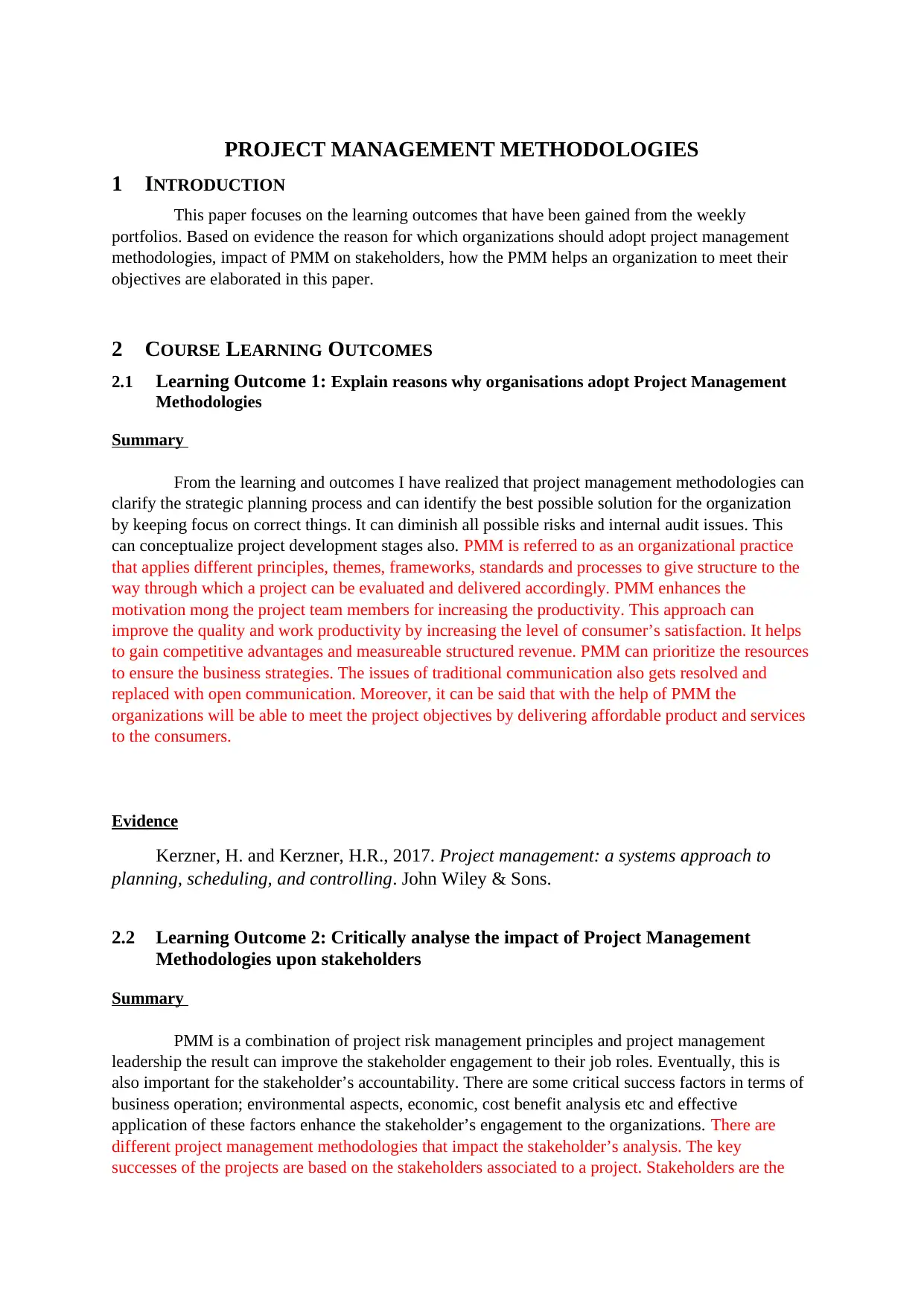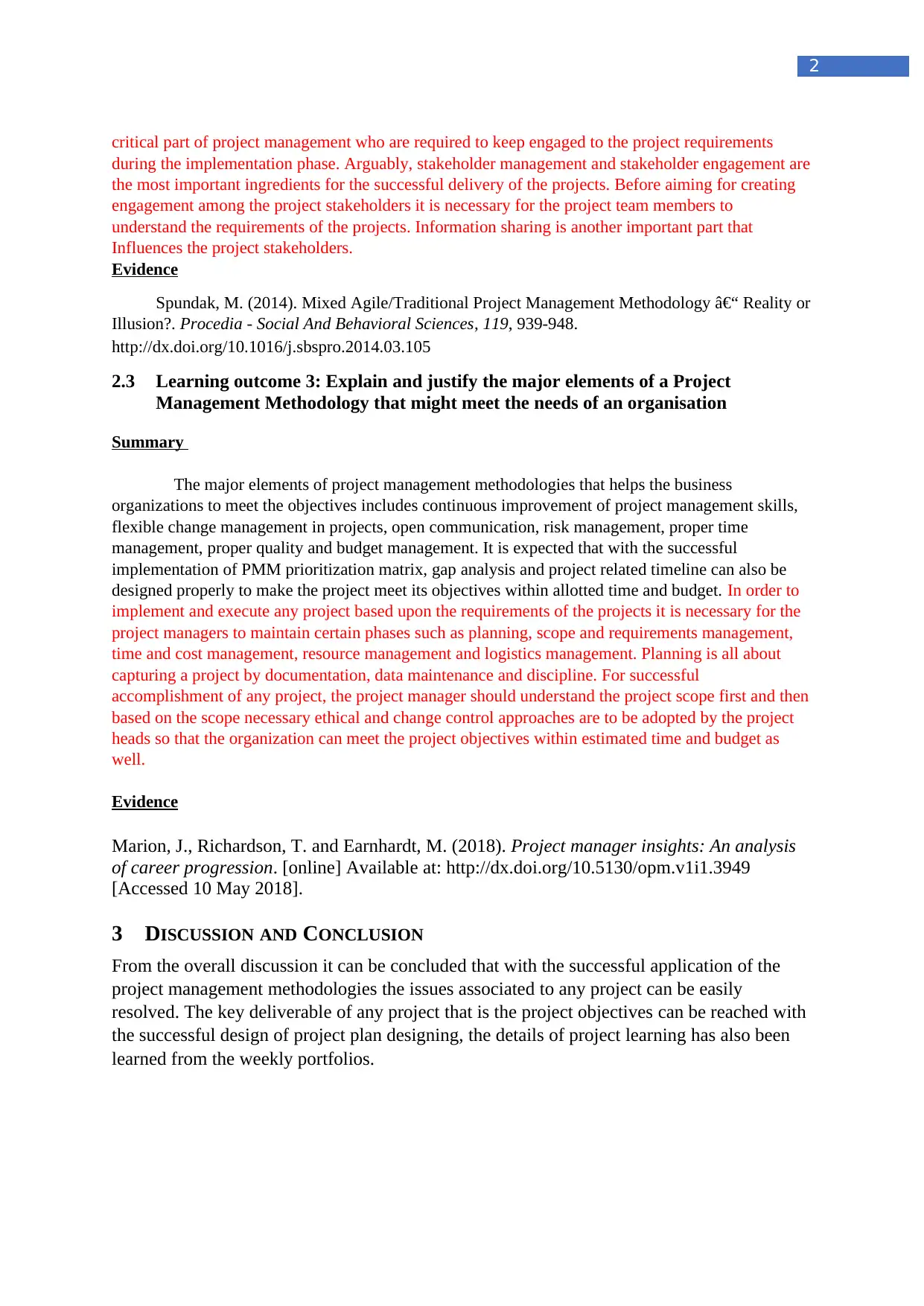Project Management Methodologies: Adoption, Impact, and Objectives
VerifiedAdded on 2023/06/11
|3
|971
|441
Report
AI Summary
This report delves into the significance of project management methodologies (PMM) for organizations, highlighting their role in clarifying strategic planning, mitigating risks, and enhancing project development. It emphasizes how PMM improves stakeholder engagement, motivation, and communication, ultimately leading to increased productivity and customer satisfaction. The report analyzes the impact of PMM on stakeholders, underlining the importance of stakeholder engagement and information sharing for project success. Furthermore, it identifies key elements of PMM, such as continuous improvement, flexible change management, and effective risk management, that enable organizations to meet their objectives within allocated time and budget. The discussion concludes that the successful application of PMM can resolve project-related issues and facilitate the achievement of project objectives through effective planning, scope management, and resource allocation.

PROJECT MANAGEMENT METHODOLOGIES
1 INTRODUCTION
This paper focuses on the learning outcomes that have been gained from the weekly
portfolios. Based on evidence the reason for which organizations should adopt project management
methodologies, impact of PMM on stakeholders, how the PMM helps an organization to meet their
objectives are elaborated in this paper.
2 COURSE LEARNING OUTCOMES
2.1 Learning Outcome 1: Explain reasons why organisations adopt Project Management
Methodologies
Summary
From the learning and outcomes I have realized that project management methodologies can
clarify the strategic planning process and can identify the best possible solution for the organization
by keeping focus on correct things. It can diminish all possible risks and internal audit issues. This
can conceptualize project development stages also. PMM is referred to as an organizational practice
that applies different principles, themes, frameworks, standards and processes to give structure to the
way through which a project can be evaluated and delivered accordingly. PMM enhances the
motivation mong the project team members for increasing the productivity. This approach can
improve the quality and work productivity by increasing the level of consumer’s satisfaction. It helps
to gain competitive advantages and measureable structured revenue. PMM can prioritize the resources
to ensure the business strategies. The issues of traditional communication also gets resolved and
replaced with open communication. Moreover, it can be said that with the help of PMM the
organizations will be able to meet the project objectives by delivering affordable product and services
to the consumers.
Evidence
Kerzner, H. and Kerzner, H.R., 2017. Project management: a systems approach to
planning, scheduling, and controlling. John Wiley & Sons.
2.2 Learning Outcome 2: Critically analyse the impact of Project Management
Methodologies upon stakeholders
Summary
PMM is a combination of project risk management principles and project management
leadership the result can improve the stakeholder engagement to their job roles. Eventually, this is
also important for the stakeholder’s accountability. There are some critical success factors in terms of
business operation; environmental aspects, economic, cost benefit analysis etc and effective
application of these factors enhance the stakeholder’s engagement to the organizations. There are
different project management methodologies that impact the stakeholder’s analysis. The key
successes of the projects are based on the stakeholders associated to a project. Stakeholders are the
1 INTRODUCTION
This paper focuses on the learning outcomes that have been gained from the weekly
portfolios. Based on evidence the reason for which organizations should adopt project management
methodologies, impact of PMM on stakeholders, how the PMM helps an organization to meet their
objectives are elaborated in this paper.
2 COURSE LEARNING OUTCOMES
2.1 Learning Outcome 1: Explain reasons why organisations adopt Project Management
Methodologies
Summary
From the learning and outcomes I have realized that project management methodologies can
clarify the strategic planning process and can identify the best possible solution for the organization
by keeping focus on correct things. It can diminish all possible risks and internal audit issues. This
can conceptualize project development stages also. PMM is referred to as an organizational practice
that applies different principles, themes, frameworks, standards and processes to give structure to the
way through which a project can be evaluated and delivered accordingly. PMM enhances the
motivation mong the project team members for increasing the productivity. This approach can
improve the quality and work productivity by increasing the level of consumer’s satisfaction. It helps
to gain competitive advantages and measureable structured revenue. PMM can prioritize the resources
to ensure the business strategies. The issues of traditional communication also gets resolved and
replaced with open communication. Moreover, it can be said that with the help of PMM the
organizations will be able to meet the project objectives by delivering affordable product and services
to the consumers.
Evidence
Kerzner, H. and Kerzner, H.R., 2017. Project management: a systems approach to
planning, scheduling, and controlling. John Wiley & Sons.
2.2 Learning Outcome 2: Critically analyse the impact of Project Management
Methodologies upon stakeholders
Summary
PMM is a combination of project risk management principles and project management
leadership the result can improve the stakeholder engagement to their job roles. Eventually, this is
also important for the stakeholder’s accountability. There are some critical success factors in terms of
business operation; environmental aspects, economic, cost benefit analysis etc and effective
application of these factors enhance the stakeholder’s engagement to the organizations. There are
different project management methodologies that impact the stakeholder’s analysis. The key
successes of the projects are based on the stakeholders associated to a project. Stakeholders are the
Paraphrase This Document
Need a fresh take? Get an instant paraphrase of this document with our AI Paraphraser

2
critical part of project management who are required to keep engaged to the project requirements
during the implementation phase. Arguably, stakeholder management and stakeholder engagement are
the most important ingredients for the successful delivery of the projects. Before aiming for creating
engagement among the project stakeholders it is necessary for the project team members to
understand the requirements of the projects. Information sharing is another important part that
Influences the project stakeholders.
Evidence
Spundak, M. (2014). Mixed Agile/Traditional Project Management Methodology – Reality or
Illusion?. Procedia - Social And Behavioral Sciences, 119, 939-948.
http://dx.doi.org/10.1016/j.sbspro.2014.03.105
2.3 Learning outcome 3: Explain and justify the major elements of a Project
Management Methodology that might meet the needs of an organisation
Summary
The major elements of project management methodologies that helps the business
organizations to meet the objectives includes continuous improvement of project management skills,
flexible change management in projects, open communication, risk management, proper time
management, proper quality and budget management. It is expected that with the successful
implementation of PMM prioritization matrix, gap analysis and project related timeline can also be
designed properly to make the project meet its objectives within allotted time and budget. In order to
implement and execute any project based upon the requirements of the projects it is necessary for the
project managers to maintain certain phases such as planning, scope and requirements management,
time and cost management, resource management and logistics management. Planning is all about
capturing a project by documentation, data maintenance and discipline. For successful
accomplishment of any project, the project manager should understand the project scope first and then
based on the scope necessary ethical and change control approaches are to be adopted by the project
heads so that the organization can meet the project objectives within estimated time and budget as
well.
Evidence
Marion, J., Richardson, T. and Earnhardt, M. (2018). Project manager insights: An analysis
of career progression. [online] Available at: http://dx.doi.org/10.5130/opm.v1i1.3949
[Accessed 10 May 2018].
3 DISCUSSION AND CONCLUSION
From the overall discussion it can be concluded that with the successful application of the
project management methodologies the issues associated to any project can be easily
resolved. The key deliverable of any project that is the project objectives can be reached with
the successful design of project plan designing, the details of project learning has also been
learned from the weekly portfolios.
critical part of project management who are required to keep engaged to the project requirements
during the implementation phase. Arguably, stakeholder management and stakeholder engagement are
the most important ingredients for the successful delivery of the projects. Before aiming for creating
engagement among the project stakeholders it is necessary for the project team members to
understand the requirements of the projects. Information sharing is another important part that
Influences the project stakeholders.
Evidence
Spundak, M. (2014). Mixed Agile/Traditional Project Management Methodology – Reality or
Illusion?. Procedia - Social And Behavioral Sciences, 119, 939-948.
http://dx.doi.org/10.1016/j.sbspro.2014.03.105
2.3 Learning outcome 3: Explain and justify the major elements of a Project
Management Methodology that might meet the needs of an organisation
Summary
The major elements of project management methodologies that helps the business
organizations to meet the objectives includes continuous improvement of project management skills,
flexible change management in projects, open communication, risk management, proper time
management, proper quality and budget management. It is expected that with the successful
implementation of PMM prioritization matrix, gap analysis and project related timeline can also be
designed properly to make the project meet its objectives within allotted time and budget. In order to
implement and execute any project based upon the requirements of the projects it is necessary for the
project managers to maintain certain phases such as planning, scope and requirements management,
time and cost management, resource management and logistics management. Planning is all about
capturing a project by documentation, data maintenance and discipline. For successful
accomplishment of any project, the project manager should understand the project scope first and then
based on the scope necessary ethical and change control approaches are to be adopted by the project
heads so that the organization can meet the project objectives within estimated time and budget as
well.
Evidence
Marion, J., Richardson, T. and Earnhardt, M. (2018). Project manager insights: An analysis
of career progression. [online] Available at: http://dx.doi.org/10.5130/opm.v1i1.3949
[Accessed 10 May 2018].
3 DISCUSSION AND CONCLUSION
From the overall discussion it can be concluded that with the successful application of the
project management methodologies the issues associated to any project can be easily
resolved. The key deliverable of any project that is the project objectives can be reached with
the successful design of project plan designing, the details of project learning has also been
learned from the weekly portfolios.

3
4 REFERENCES
Kerzner, H. and Kerzner, H.R., 2017. Project management: a systems approach to planning,
scheduling, and controlling. John Wiley & Sons.
Marion, J., Richardson, T. and Earnhardt, M. (2018). Project manager insights: An analysis
of career progression. [online] Available at: http://dx.doi.org/10.5130/opm.v1i1.3949
[Accessed 10 May 2018].
Spundak, M. (2014). Mixed Agile/Traditional Project Management Methodology – Reality or
Illusion?. Procedia - Social And Behavioral Sciences, 119, 939-948.
http://dx.doi.org/10.1016/j.sbspro.2014.03.105
4 REFERENCES
Kerzner, H. and Kerzner, H.R., 2017. Project management: a systems approach to planning,
scheduling, and controlling. John Wiley & Sons.
Marion, J., Richardson, T. and Earnhardt, M. (2018). Project manager insights: An analysis
of career progression. [online] Available at: http://dx.doi.org/10.5130/opm.v1i1.3949
[Accessed 10 May 2018].
Spundak, M. (2014). Mixed Agile/Traditional Project Management Methodology – Reality or
Illusion?. Procedia - Social And Behavioral Sciences, 119, 939-948.
http://dx.doi.org/10.1016/j.sbspro.2014.03.105
⊘ This is a preview!⊘
Do you want full access?
Subscribe today to unlock all pages.

Trusted by 1+ million students worldwide
1 out of 3
Related Documents
Your All-in-One AI-Powered Toolkit for Academic Success.
+13062052269
info@desklib.com
Available 24*7 on WhatsApp / Email
![[object Object]](/_next/static/media/star-bottom.7253800d.svg)
Unlock your academic potential
Copyright © 2020–2026 A2Z Services. All Rights Reserved. Developed and managed by ZUCOL.
